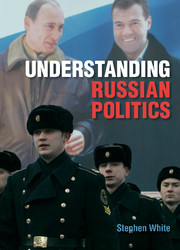Book contents
- Frontmatter
- Contents
- List of figures
- List of tables
- Preface
- Map: administrative units under the 1993 Constitution
- 1 From communist to postcommunist rule
- 2 Voters, parties and parliament
- 3 Presidential government
- 4 From plan to market
- 5 A divided society
- 6 Changing times, changing values
- 7 Russia and the wider world
- 8 What kind of system?
- Notes
- A Note on surveys
- Index
- References
8 - What kind of system?
Published online by Cambridge University Press: 05 June 2012
- Frontmatter
- Contents
- List of figures
- List of tables
- Preface
- Map: administrative units under the 1993 Constitution
- 1 From communist to postcommunist rule
- 2 Voters, parties and parliament
- 3 Presidential government
- 4 From plan to market
- 5 A divided society
- 6 Changing times, changing values
- 7 Russia and the wider world
- 8 What kind of system?
- Notes
- A Note on surveys
- Index
- References
Summary
If it was no longer ‘communist’, did that mean that a newly independent Russia had become a ‘democracy’? Or at least, that it was ‘in transition’? Competitive elections, freedom of speech and a commitment to the rule of law appeared to suggest a positive answer. But elections came increasingly to be regulated by the authorities themselves, freedom of speech (at least on television) became increasingly restricted, and there was little reality to a rule of law if judges were corrupt and high-ranking officials and rich businessmen were effectively outside its scope. Another view was that postcommunist Russia was an ‘authoritarian’ system; but so were many other countries that lay in a large and heterogeneous ‘grey zone’ between Western-style democracy and naked dictatorship. There appeared to be strong arguments in these circumstances for avoiding the term ‘democracy’ altogether and focusing instead on mechanisms of accountability and their effectiveness in Russia as compared with other countries.
Just as the October revolution in 1917 was a landmark in world history, so too the end of communist rule in its country of origin appeared to be a turning-point, and not just in Russia. For Boris Yeltsin, speaking just after the attempted coup had collapsed, the Soviet people had ‘thrown off the chains of seventy years of slavery’. The defeat of the coup, he wrote in his memoirs, was actually much more than this: it meant the end of the twentieth century itself, when in just three days, between 19 and 21 August 1991, ‘one century finished and another began’.
- Type
- Chapter
- Information
- Understanding Russian Politics , pp. 321 - 370Publisher: Cambridge University PressPrint publication year: 2011



